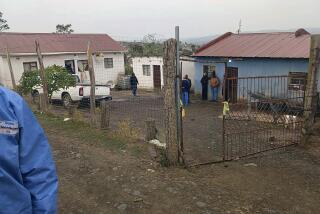Tutu Calls for a Truce Between Black Factions : Anti-Apartheid Rivals in South Africa Urged to Halt Violence During Talks
JOHANNESBURG, South Africa — Archbishop Desmond Tutu called Sunday for an immediate cease-fire in the murderous political feuding between rival anti-apartheid groups in South Africa’s strife-torn Natal province, after eight more blacks were killed in one of the bloodiest weeks in the country this year.
“This shocking carnage has to stop,” Tutu declared, saying that he will attempt to mediate if asked to do so. “The absolute minimum condition necessary as we enter 1988 is an immediate cease-fire--a complete suspension of all violence while peace talks are under way.
“The first step towards achieving this would be for all political leaders to make an explicit and unequivocal call on their followers to cease acts of violence forthwith, and for all involved in the peace process to avoid saying or doing anything that could prejudice the talks.”
Blames Apartheid
Tutu, the Anglican archbishop of Cape Town, attributed the increased violence primarily to apartheid, South Africa’s system of racial separation and minority white rule, rather than to political feuding among blacks.
“The maintenance of hard-core apartheid--the exclusion of black South Africans from political power--generates violence within the black community,” he said in a statement released in Cape Town.
But he also criticized those black leaders who have refused to accept a truce while a political accommodation is worked out. “Allowing fighting to continue during peace talks inflames passions and opens up the prospect of violence feeding on itself in a ghastly spiral of unending revenge killings,” he said.
Nearly 250 people have been killed in the Natal fighting over the last four months, mostly in the black ghetto townships around the provincial capital of Pietermaritzburg and the port city of Durban. With the latest clashes, which have left 39 dead in the past 10 days, the conflict appears to be escalating.
Eight More Slain
Police headquarters in Pretoria reported that four blacks were killed in clashes around Pietermaritzburg on Saturday, the second day of increased fighting over the Christmas holiday, and that four others were killed around Durban and Hammersdale.
The Pietermaritzburg deaths resulted, police said, from clashes between supporters of the United Democratic Front, an alliance of 750 anti-apartheid groups with 3 million members, and Zulus who back Inkatha, the predominantly Zulu political movement led by Chief Mangosuthu Gatsha Buthelezi.
Three of the four, all men, died in fighting at Taylor’s Halt, the scene of heavy clashes earlier this month, and the fourth was burned to death at neighboring Magwanyani, according to police.
Two More Men Killed
Two more men were killed and seven people were injured outside Durban, according to police, when relatives and friends of a victim in earlier unrest attacked those they believed responsible for his death and set their houses on fire. Police said they eventually dispersed the mobs with gunfire, tear gas and rubber bullets and arrested 42 people.
A black policeman, attacked at his home near Durban, killed another man when he fired his shotgun at the crowd that was stoning his house and attempting to stab him and his family with knives.
The body of the eighth victim, a man who had been stabbed repeatedly and then shot, was found near Hammersdale, the focus of much of the political feuding between Inkatha and the United Democratic Front over the last year.
The return home of many Zulu men who work as migrant laborers in the country’s factories and mines had been expected to increase tensions over the Christmas holidays. Church leaders in Pietermaritzburg, Durban and other Natal centers fear there will be more clashes in the next two weeks.
With police apparently unable to end the clashes despite their extensive powers under South Africa’s 18-month-old state of emergency, clergy, community leaders, businessmen and others have been trying to mediate between Inkatha and the United Democratic Front, but with very limited success so far.
2 Conflicting Visions
The two groups’ rivalry stems from differences over ways to end apartheid and from conflicting visions of a post-apartheid South Africa.
“I am deeply concerned that we are entering 1988 with no definite prospect of an end to the dreadful maiming and slaughter of people in the Pietermaritzburg area,” Tutu said. “Without wishing to cut across what others are doing, I remain willing to continue to play whatever role may be necessary in searching for a solution to the violence.”
More to Read
Sign up for Essential California
The most important California stories and recommendations in your inbox every morning.
You may occasionally receive promotional content from the Los Angeles Times.










